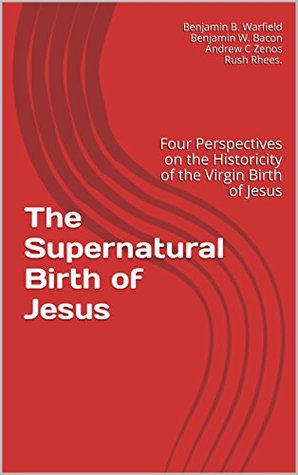- Bible
- Read the Bible
- Bible Versions
- Verse of the Day
- Reading Plans
- Verses by Topic
- Books of the Bible
- Bible Images
- Study
- Commentaries
- Concordances
- Dictionaries
- Encyclopedias
- Sermons
- Bible Atlas & Maps
- BP Wiki
- Devotionals
- Today's Devotionals
- Light of the World
- All Devotionals
- Inspirational Quotes
- More
- Picture Quotes
- Videos
- Inspirational
- Bible Study
- What The Bible Says
- Bible Q&As
- Daily Bread
- Bible by Genre
- Bible Stories
- Random Bible Verse
- Community
- Store
The Supernatural Birth of Jesus: Four Perspectives on the Historicity and Meaning of the Virgin Birth of Jesus
by Benjamin B. Warfield
In 1906 The American Journal of Theology commissioned four scholars to write on the question of the ‘Supernatural Birth of Jesus and whether belief in the same is essential for Christianity. These contributions have been reformatted to make it more readily accessible to readers using e-readers.
This book reproduces their contributions. In it Benjamin W Bacon and Andrew C Zenos, respectively from Yale Divinity School and McCormick Theological Seminary address the question of whether the supernatural birth of Jesus can be historically established.
Also contributing are Rush Rhees and Benjamin B Warfield, respectively from the University of Rochester and Princeton Theological Seminary address the theological question of whether the supernatural birth of Jesus is an essential doctrine of Christianity.
This book reproduces their contributions. In it Benjamin W Bacon and Andrew C Zenos, respectively from Yale Divinity School and McCormick Theological Seminary address the question of whether the supernatural birth of Jesus can be historically established.
Also contributing are Rush Rhees and Benjamin B Warfield, respectively from the University of Rochester and Princeton Theological Seminary address the theological question of whether the supernatural birth of Jesus is an essential doctrine of Christianity.
BUY NOW
Kindle Edition, 40 pages
Published January 5th 2016 by Everard
© 2025 Bibleportal.com All rights reserved.

Benjamin Breckinridge Warfield was professor of theology at Princeton Seminary from 1887 to 1921. Some conservative Presbyterians consider him to be the last of the great Princeton theologians before the split in 1929 that formed Westminster Seminary and the Orthodox Presbyterian Church.
Warfield entered Princeton University in 1868 and graduated in 1871 with high honors. Although Warfield studied mathematics and science in college, while traveling in Europe he decided to study theology, surprising even many of his closest friends. He entered Princeton Seminary in 1873, in order to train for ministry as a Presbyterian minister. He graduated in 1876. For a short time in 1876 he preached in Presbyterian churches in Concord, Kentucky and Dayton, Ohio as a "supply pastor". In late 1876 Warfield and his new wife moved to Germany where he studied under Ernst Luthardt and Franz Delitzsch. Warfield was the assistant pastor of First Presbyterian Church in Baltimore, Maryland for a short time. Then he became an instructor at Western Theological Seminary, which is now called Pittsburgh Theological Seminary. He was ordained on April 26, 1879.
During his tenure, his primary thrust (and that of the seminary) was an authoritative view of the Bible. This view was held in contrast to the emotionalism of the revival movements, the rationalism of higher criticism, and the heterodox teachings of various New religious movements that were emerging. The seminary held fast to the Reformed confessional tradition — that is, it faithfully followed the Westminster Confession of Faith.
Warfield's view of evolution may appear unusual for a conservative of his day. He was willing to accept that Darwin's theory might be true, but believed that God guided the process of evolution, and was as such an evolutionary creationist.
... Show more